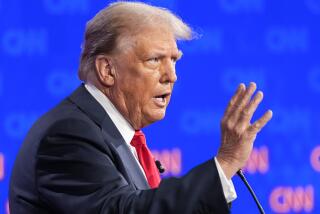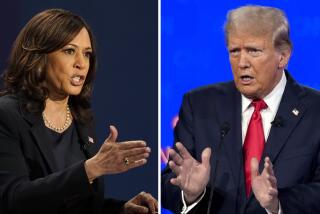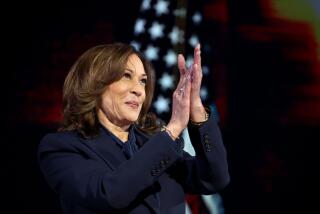Mitt Romney accuses Obama of ‘hiding’ his intent
WASHINGTON — Before he took his campaign for the Republican nomination to the next primary battleground in Pennsylvania, Mitt Romney used the same Washington stage where President Obama had spoken a day before to accuse his likely general election rival of plans to wage a “hide-and-seek campaign” in the fall.
The former Massachusetts governor, one day after winning a set of primaries that all but ensured he would be his party’s nominee, used a “hot mic” incident involving the president and his Russian counterpart to cast doubt about what Obama would do if he won a second term.
Referring to Obama telling Dmitry Medvedev last week that he’d have more “flexibility” to negotiate on missile defense after his election, Romney asked: “On what other issues will he state his true position only after the election is over?”
“His intent is on hiding. You and I will have to do the seeking,” Romney told a gathering of news executives and editors Wednesday.
Obama, speaking to the same group on Tuesday, used the House Republican budget plan written by Rep. Paul D. Ryan (R-Wis.), a Romney supporter, to frame his own general election case against Romney.
Obama noted that Romney had called the Ryan plan “marvelous,” but said it actually would “gut” investments meant to grow the middle class to pay for tax cuts for the affluent. The goal: To define Romney before he has the chance to reintroduce himself to the broader national electorate.
“This isn’t a budget supported by some small rump group in the Republican Party,” the president said. “This is now the party’s governing platform. This is what they’re running on.”
The White House said Wednesday it wasn’t a campaign speech, but a “wonky exposition of his views.”
Romney responded as if the two were in campaign mode, however, and used his speech instead to say Obama has lacked the leadership needed in the office to guide the nation’s economy onto surer footing.
He said the president lacked focus when he took office, delegating an economic stimulus plan to Democratic leaders in Congress so he could instead pursue a “government takeover of healthcare and apologizing for America abroad.”
On the budget, Romney said Obama “railed against arguments no one is making — and criticized policies no one is proposing.”
“I understand some people are amused that I have so many ideas. But I think the American people will prefer it to President Obama’s grand total of zero,” he said.
Among those ideas: Cut all marginal tax rates, repeal the president’s health reform law and cut “programs that we cannot afford.” Romney said he also would reform Social Security and Medicare in a way that “strengthens them for future generations,” using the issue of entitlement reform to cast Obama as weak.
“Unlike President Obama, I have the courage to stand behind my plan and the leadership to enact it,” he said.
“This November, we will face a defining decision. Our choice will not be one of party or personality. This election will be about principle. Freedom and opportunity will be on the ballot.”
Romney also accused Obama of “rhetorical excess” and using “straw men to distract from his record.” In response, the Obama campaign spokesman said in a statement that it was “Romney who made straw man attacks today, offering a series of criticisms against a leader that bears no resemblance to President Obama.”
Much as Romney would like to focus exclusively on Obama at this point, he was set to head to Pennsylvania after the speech to campaign for the state’s April 24 primary. Notably, in his victory speech in Wisconsin a day earlier, Romney appealed to primary voters there as well as New York, Connecticut, Rhode Island and Delaware, not to pivot to the November election.
Asked whether he’d contacted rivals Rick Santorum, Newt Gingrich or Ron Paul to drop out of the race, Romney said he hadn’t. But, he added, “I hope that we’re able to resolve our nomination process as soon as possible, of course.”
At the luncheon, hosted by the Newspaper Assn. of America and American Society of News Editors, Romney also reflected on how quickly the pace of the news cycle and the nature of reporting had changed just in the four years since his last campaign.
“In 2008, the coverage was all about what I might have said in a speech. Today it’s about what brand of jeans I’m wearing or what I had for lunch,” he said. “Frankly, in some of the new media, I find myself missing the presence of editors to exercise quality control.”
More to Read
Get the L.A. Times Politics newsletter
Deeply reported insights into legislation, politics and policy from Sacramento, Washington and beyond. In your inbox three times per week.
You may occasionally receive promotional content from the Los Angeles Times.











